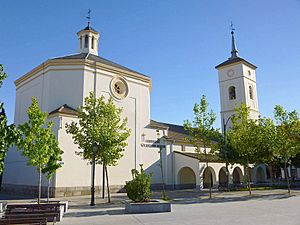Majadahonda facts for kids
Quick facts for kids
Majadahonda
|
|||
|---|---|---|---|

Church of Santa Catalina Mártir
|
|||
|
|||
| Country | Spain | ||
| Region | Community of Madrid | ||
| Comarca | Madrid metropolitan area | ||
| Area | |||
| • Total | 38.48 km2 (14.86 sq mi) | ||
| Elevation | 743 m (2,438 ft) | ||
| Population
(2018)
|
|||
| • Total | 71,785 | ||
| • Density | 1,865.51/km2 (4,831.7/sq mi) | ||
| Demonym(s) | Majariegos | ||
| Time zone | UTC+1 (CET) | ||
| • Summer (DST) | UTC+2 (CEST) | ||
| Postal codes in Spain |
28220, 28221, 28222
|
||
| Area code(s) | 34 (Spain) + 91 (Madrid) | ||
| Patron Saint | St. Catherine of Alexandria | ||
| Climate | Csa | ||
Majadahonda (Spanish: [maxaðaˈonda]) is a town in Spain. It is located about 16 kilometers (10 miles) northwest of Madrid. It is part of the Community of Madrid region. The town is found along the A6 motorway, which connects Madrid to A Coruña. In 2009, a large public hospital, Puerta de Hierro, moved to Majadahonda. It is now a modern medical center.
Contents
History of Majadahonda
Early Village Life
Majadahonda started as a small village. By the 1500s, it had about 400 people. By the end of that century, there were nearly 200 houses and about 800 residents. Famous Spanish writers like Miguel de Cervantes and Francisco de Quevedo even mentioned Majadahonda in their books.
The center of the village back then was the Church of Santa Catherine. There was also a small hospital and a simple inn. The town grew along streets named San Roque, Calle Real, and Calle Christ.
Growth and Challenges
In the 1700s, Majadahonda's population grew a lot. It reached about 800 people. Most men worked as day laborers. They served a few rich farmers and landowners.
In 1812, during the War of Spanish Independence, a big battle happened in Majadahonda. French and British troops fought here. The town was left in ruins after the battle. Later, land was sold off, and rich noble families bought it. One noble, the marqués de Remisa, used his power to get a train station built on his land. This is how the current train station started, though it's not in its original spot.
Modern Majadahonda
The Spanish Civil War (1936-1939) caused a lot of damage. Like Madrid, Majadahonda mostly supported the Republican side. The town was almost empty during the war. After the war, Majadahonda was completely rebuilt. It was given a more modern layout with a grid of streets.
In the 1960s, the town changed a lot. More people moved in, and new buildings went up. Majadahonda stopped being a farming town. It became a "dormitory town" for Madrid. This means many people live in Majadahonda but work in Madrid. So, the town now depends a lot on services like shops and businesses.
Majadahonda strongly supported the political changes in Spain. The town voted in favor of the Spanish Constitution of 1978. In the first local elections, the old powerful families lost control. A new, democratically elected City Council took over.
Broadcasting Station
Near Majadahonda, in a place called Las Rozas, is Spain's most powerful radio station. It broadcasts programs for RNE-1 (Radio Nacional de España). This station uses a very tall antenna mast. It is 264 meters (866 feet) tall and was built in 1962. At that time, it was the tallest structure in the Madrid area.
The station also has a second mast, which is 130 meters (427 feet) tall. This mast is used to broadcast RNE-5 and COPE Madrid.
Sports in Majadahonda
Majadahonda is home to a football club called CF Rayo Majadahonda. For many years, they played in the 2B division. In the 2018-2019 season, they played in the 2A division.
The town is also known for its many sports facilities. These include an athletics stadium and a golf course. There are also several places to play padel, tennis, and football. The public indoor swimming pool closed in 2021.
Twin Towns
Majadahonda has "twin towns" in other countries. This means they have a special friendship and often share cultural events.
 Clamart, France
Clamart, France
There is a park in Majadahonda named after Clamart. It is located near the train station.
There is also a park named Ferencváros south of the town center. Ferencváros is a district in Budapest, Hungary.
See also
 In Spanish: Majadahonda para niños
In Spanish: Majadahonda para niños




